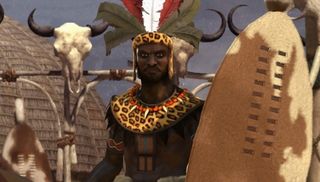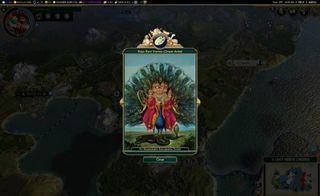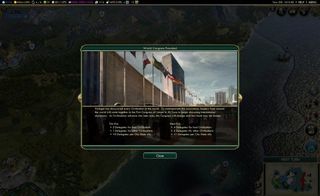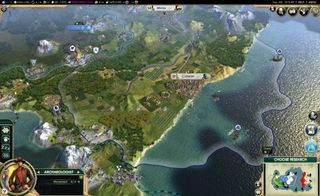Civilization V: Brave New World hands on - how camels and art solve the late game slump

A fire has been raging through Paris for the past four decades. Also, Jesus has just been born.
"The caravan unit is essentially a 'business camel' who brokers trade agreements."
That's the news from the other end of the bank of desks as I settle in to preview Civilization V: Brave New World - an expansion aimed primarily at spicing up the late stages of the game. My own Parisians, however, remain unroasted and un-Jesused because I've spent the last few turns ignoring Napoleon and trying to work out whether it would be prudent to build a windmill.
The windmill situation is clearly too complicated so I build a caravan unit instead. This is mostly because the caravan unit is essentially a "business camel" who goes off to other cities and brokers trade agreements on my behalf. In my head he has a pinstripe suit and a briefcase full of important documents.

The caravan appears as an option as soon as you research animal husbandry and creates trade routes. Looking to other civilisations, the most profitable trade routes are built between cities with few resources in common - business camels appreciate a diverse portfolio. But trade routes can also be established between two of your own cities. If one has a workshop, the trade route can export production giving a boost to cities founded late game which would otherwise be outpaced at every opportunity.
"Brave New World tries to deal with the late game peaceful play problem."
As time passes and you get deeper into the expansion you'll realise that the roving business camel was foreshadowing. Brave New World is actively trying to deal with the late game peaceful play problem - namely that you end up hemmed in on all sides with no will to explore, hitting "Next Turn" and eating biscuits.
"It's been a symptom of all Civ games - the late game just isn't as compelling as the beginning," admits Dennis Shirk, senior producer. Firaxis' solution? To prod you into activity via a mixture of international trade (business camels plus cargo ships), cultural scuffles, and the introduction of a World Congress for equal quantities of diplomacy and dickbaggery sans frontiers.

Culture now comes in two flavours: defensive and offensive. Defensive culture is the stuff of previous Civ iterations and is created by building wonders or landmarks. In Brave New World it serves to counter aggressive culture: tourism.
PC Gamer Newsletter
Sign up to get the best content of the week, and great gaming deals, as picked by the editors.
"Invest in tourism and artwork becomes a weapon. You're Charles Saatchi with a diplomatic passport."
Invest in tourism and artwork becomes a weapon. Your civilisation can now gobble up a great artist and spit out one of their famous real-world creations to be installed in a cultural institutions. Pair your burgeoning art scene with increased interaction with other civilisations and tourism flourishes: you're Charles Saatchi with a diplomatic passport.
The World Congress also appears in the latter part of the game; a cyclical system where two players - the host civilisation and the one with most delegates - make proposals. Nations preferring the diplomatic route to victory (or just partial to a spot of political wrangling) can spend turn after turn lobbying for support, indulging in espionage or trading votes to get their preferred policies approved.

These can be positive mandates for the good of humanity or a chance to indulge spite and retribution. "It's not always going to be a clean and shiny, optimistic future," observes Shirk. Indeed, the expansion's title, "Brave New World", explicitly references Huxley's dystopian novel and the ideological and cultural upheavals of the twentieth century.
"Don't expect Firaxis to stop tinkering with Civ V just yet."
But, whether you choose to play as a cynic or an optimist, Brave New World is hellbent on keeping you actively participating to the final turn. So although the expansion tentatively marks Civ V as complete don't expect the tinkering to stop just yet.
"We've already got updates on our schedule," says Shirk. "You can't know how the ideal arc for a game is going to fall until a million people are playing it - we want to have the best version of the game out there."

